13. 07. 2014
Cavtat, July 12, 2014 – As regards the Summit100 thematic roundtable discussions on different economic sectors, the participants’ biggest interest lies in those featuring energy projects, food production and tourism. At the seven roundtables, dedicated to the said three issues as well as transport and logistics, construction, healthcare and pharmaceuticals and the IT sector, the region’s business leaders will discuss ideas for business cooperation within particular industries. Following the roundtables, at the central panel discussion, the entrepreneurs’ ideas will be presented to the region’s political leaders Mr. Ivo Josipović, Mr. Bujar Nishani, Mr. Bakir Izetbegović, Mr. Željko Komšić, Mr. Nebojša Radmanović, Mr. Filip Vujanović, Ms. Atifete Jahjaga, Mr. Gjorge Ivanov, Mr. Borut Pahor and Mr. Tomislav Nikolić.
The conference will be attended by around a hundred business leaders from the SEE countries. They will participate in roundtable discussions, grouped according to the economic sectors, and discuss the impediments to and possibilities of cooperation in the region. The proposals of how to improve regional cooperation in particular sectors will be presented in a plenary panel session featuring the state delegations from the SEE countries, including Albania, Bosnia and Herzegovina, Croatia, Kosovo, Macedonia, Montenegro, Slovenia and Serbia, whose arrival has been confirmed for July 14. On the second day of the conference, the participants will focus on how to attract global investors to the region, with some of the largest investors in the SEE countries sharing their experiences, while the key managers of the region’s prominent banks will attend the final panel and talk about accessing finances for different business projects.
Announcing the discussion at Summit100, Agrokor’s Senior Executive Vice President Ljerka Puljić said the region had a long tradition as well as considerable experience and knowledge in producing and processing food products. “Those are definitely the strengths of this particular industry and are basis for the competitiveness in food production. The region has a possibility to produce considerable amounts of raw materials for the food industry as well as technological know-how in processing raw materials. The possible weaknesses that we all feel primarily include the size of the market, which is rather fragmented, small and with a low consumer potential, which is a huge challenge for the economy of scale. Therefore, any potentials or ways out should be looked for in applying knowledge and new technologies across the food production chain; however, without concentration, mergers or a unique regional market it will be difficult to fully utilize the potentials of this region and its food industry. Several positive natural predispositions are, unfortunately not enough to progress on the competitiveness rankings. On the contrary, because we are so small, we should be looking for a way out through mutual cooperation since it is the only thing that will enable economically justified investments in top technologies and people’s knowledge,” Ljerka Puljić concluded.
The markets of the countries in the region are rather small but their potential, particularly through cooperation with the neighboring countries, is considerable. This particular topic, as well as concrete cooperation between companies, will be discussed at seven theme-based roundtable discussions featuring CEOs across the region.
“The differences between the countries are minor; they have the same problems relating to infrastructure, rule of law and institutions’ efficiency, and in some countries there is political instability as well. These are issues burdening the countries in the region,” said the President of the Management Board of NLB Bank Janko Medja. “Energy is the current buzz word in Bosnia and Montenegro, and it is the same with tourism in Montenegro. On the other hand, the size of the Serbian market comes with certain specific characteristics; however, in order for them to attract investors, the country needs to work on the rule of law. Foreign investors, banks included, cannot have an inferior position when realizing their rights and claiming compensation before the court,” believes Medja.
“Serbia has strong political and economic ties to Russia and should therefore be a bridge for economic relations. The same can be said of the cultural and political relations between Bosnia and Herzegovina and Turkey,” said AT Kearney’s senior director for SEE Ivo Šimek. “Macedonia and Kosovo are intertwined nationally and depend on the neighbors’ political influence, while Croatia and Slovenia as EU member states have come across certain impediments in their trade with the non-EU states. In order to create a more favorable entrepreneurial climate in the region, the process of integration should be sped up, and that means the process of democratization as well. Marketing-wise, the region and the individual countries in it have not yet created a positive image in Europe. The politics has failed to create a possibility of attracting major green field investments, the corruption is rather high, the legal framework very unreliable and old-fashioned, and the public administration generally very poor,” warns Šimek.
